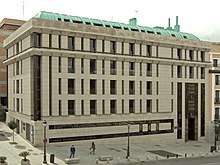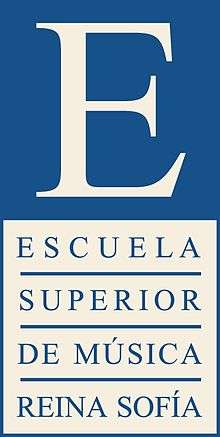Reina Sofía School of Music
 | |
| Type | Private |
|---|---|
| Established | 1991 |
| President | Paloma O'Shea |
| Principal | Fabián Panisello |
| Students | 120 (2017–2018) |
| Address |
Requena, 1, 28013, Madrid, Spain 40°25′01″N 3°42′44″W / 40.41694°N 3.71222°WCoordinates: 40°25′01″N 3°42′44″W / 40.41694°N 3.71222°W |
| Campus | Urban |
| Website |
www |
The Reina Sofía School of Music (Escuela Superior de Música Reina Sofía in Spanish) is a private music school founded in Madrid, Spain, in 1991 by Paloma O'Shea. It is part of the Albéniz Foundation.[1]
History
The School was founded by Paloma O'Shea[2] in 1991[1] in Madrid, in order to provide young Spanish musicians with a solid artistic education without the need to study abroad in other European countries.[1]
The governing bodies of the School are chaired by a Board of Trustees, established in 1991. This board reports directly to the Board of Trustees of the Albéniz Foundation. The Honour President of the School's Board is Queen Sophie. Besides the Board, the School has the support of an Academic Committee, made up of forty representative personalities of the cultural and political spheres, many of whom have been or are active members of the Faculty and Steering Committee.
The School's location is in Plaza de Oriente, next to the Royal Palace and to Teatro Real. This location, situated in Requena street, housed once the Performing Arts and Dance School. The inception of the School can be found in the International Piano Competition Paloma O'Shea, which Paloma O’Shea created in 1972, and in the masterclasses organised by her from 1981 on in collaboration with Universidad Internacional de Verano Menéndez Pelayo, also in Santander.
In the first steps of the project, as well as in the selection of the teaching staff, we counted on the advice of great masters such as Yehudi Menuhin, Mstislav Rostropovich, Daniel Barenboim, Zubin Mehta and Alicia de Larrocha, who also were or are part of the Academic Committee and of the Board of the School, as well as active consultants of the Chairs. The collaboration of Federico Sopeña and Enrique Franco, key figures of twentieth-century Spanish musical culture, was also essential.
Programs
The purpose is to train first-rate musicians, and all the necessary resources are made available to students and teachers with this end in mind. Originally the School offers individually tailored instruction to ensure that each student gets the training that he or she needs[3] without following any pre-established program of studies, but in 2016 they introduced an official 4-year Bachelor of Music degree. It also offers post-graduate and pre-college preparatory training.
Teaching staff
The Reina Sofía Music School has teachers who have excelled in the exercise of the two aspects of their masters: art and education. Therefore, the faculty holding chairs is composed of leading figures of recognized international prestige. In addition to this regular team, each year professors invited to the Masterclasses Program complement the work of the school with different conceptions and perspectives.
Academic and artistic activity
The elaboration of academic organization follows a basic principle of classical training: personalized teaching. Only the personal assessment of the student by his teacher, assessed with other disciplines oriented to his global training dictated by the center's faculty, allow the design of a program tailored to the potential of the student. This program ensures musical learning in all its breadth integrating the different dimensions of the student's personality. In addition, one of the most characteristic aspects of the academic training in the School is its intense artistic activity. This means that, each academic year, the School organizes more than 300 concerts in its Auditorium and in different venues throughout Spain. The duration of the stay in the School depends directly on the student's possibilities of learning. Although the average is between two and four years, it can be said that students end when their teachers decide that they have already reached a certain artistic maturity. In addition, since the 2015-16 academic year, accredited studies are taught in the School within the Bologna program.
The General Training Plan covers, therefore, the specific training of the instrumentalist or singer in the area of performance, completed with the academic disciplines, the obligatory artistic projection and the encouragement of the seminars proposed in the Complementary Training Department. This academic plan includes the following departments:

- Performance Department.
- Academic Department.
- Artistic Department.
- Complementary Training Department.
- Masterclasses Program.
- Audiovisual Edition Program.
The School has also developed an online education program in collaboration with five other important European schools, and has created an educational music portal web aimed at students, teachers, scholars or music fans in which masterclasses of great masters are offered. Thus, it contributes to preserve the historical musical heritage in the form of classes of such masters that would otherwise be lost. This website is called Magister Musicae.
Students
The main purpose of the School is universality and therefore it aspires to summon students of any social or geographical origin, with no other requirement than the talent and the delivery to a formative work designed to surpass the distinction between musical technique and artistic expression, putting the student in direct contact with the public. Its mission is not only to train soloists, but musicians capable of easily integrating into important chamber orchestral groups, winning prizes or accessing positions of Professors in schools and conservatories. Its work is designed for young people who in a few years will return to the same scenarios where they acted as students, already as excellent professionals.
The School makes available to students from abroad or outside Madrid, the Student Residence, aimed at establishing relations between students, environment and teachers, with the idea that their artistic life and coexistence be more rewarding.
Notable alumni
![]()
![]()
![]()
![]()
![]()
![]()
![]()
![]()
![]()
![]()
![]()
![]()
![]()
![]()
![]()
![]()
![]()
![]()
![]()
![]()
![]()
![]()
![]()
![]()
![]()
Notable former and present staff


















Guest conductors
![]()
![]()
![]()
![]()
![]()
![]()
![]()
![]()
![]()
![]()
![]()
![]()
![]()
![]()
![]()
![]()
![]()
![]()
![]()
![]()
![]()
![]()
![]()
![]()
![]()
![]()
![]()
![]()
![]()
![]()
![]()
See also
References
- 1 2 3 "Historia". Escuela Superior de Música Reina Sofía. Retrieved 13 July 2010.
- ↑ Enrique Franco (8 June 1984). "PERFIL: Paloma O'Shea". El País. Retrieved 8 January 2010.
- ↑ "La Escuela de Música Reina Sofía podría cerrar en dos años". Retrieved 11 June 2013.
- ↑ "Aquiles Machado". Retrieved 11 June 2018.
- ↑ "Concierto de Arcadi Volodos en Zaragoza". Retrieved 11 June 2018.
- ↑ "Biografía Asier Polo". Retrieved 11 June 2018.
- ↑ "Biografía Celso Albelo". Retrieved 11 June 2018.
- ↑ "Biografía". Retrieved 11 June 2018.
- ↑ "Biography". Retrieved 11 June 2018.
- ↑ "José Vicente Castelló". Retrieved 11 June 2018.
- ↑ "Juan Pérez Floristán". Retrieved 11 June 2018.
- ↑ "Latica Honda-Rosenberg". Retrieved 11 June 2018.
- ↑ "Antiguos Alumnos Sobresalientes". Retrieved 11 June 2018.
- ↑ "Pablo Ferrández". Retrieved 11 June 2018.
- ↑ "Biografia". Retrieved 11 June 2018.
- ↑ "Sol Gabetta". Retrieved 11 June 2018.
- ↑ "Biography". Retrieved 11 June 2018.
- ↑ "Wen Ziao Zheng Viola". Retrieved 11 June 2018.
- ↑ "Concierto del violinista Xavier Inchausti en el Auditorium". Retrieved 11 June 2018.
- ↑ "Biografía". Retrieved 11 June 2018.
- ↑ "El Cuarteto". Retrieved 11 June 2018.
- ↑ "Biography". Retrieved 11 June 2018.
- ↑ "Johane González Seijas". Retrieved 11 June 2018.
- ↑ "Stanislav Ioudenitch". Retrieved 11 June 2018.
- ↑ "Ismael Jordi (tenor) No olvidar nunca mis orígenes aunque alcance el éxito". Retrieved 11 June 2018.
- ↑ "Claudio Martínez Mehner". Retrieved 11 June 2018.
- ↑ "Biography". Retrieved 11 June 2018.
- ↑ "Emil Rovner". Retrieved 11 June 2018.